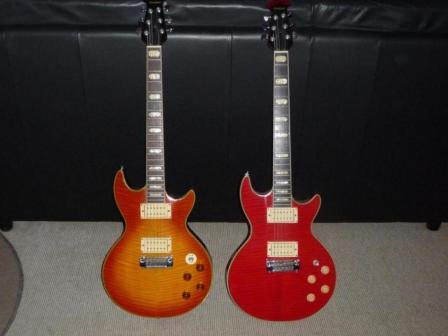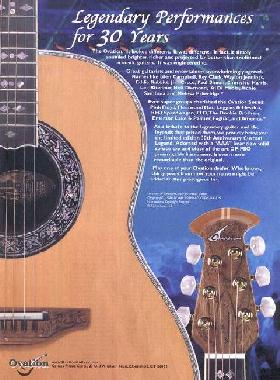|
|
Joined:
March 2008
Posts: 12
Location: Ottawa Canada | As a new Ovation owner and lover I have just aquired a 1537 stage model Ovation, I plan to play this guitar in my band and use it often, my question is that it has about 4 small cracks in the varnish that have not gone through to the wood, and I know I wont spend the money to send it to the factory and have it restored to original so should I have it repaired locally {Ottawa Canada} or leave it and enjoy it the way it is. I know the cracks have nothing to do with the beautifull tone it only bothers me at times when I sit back and admire it. |
|
| |
|

Joined:
June 2007
Posts: 3084
Location: Brisbane Australia | If it's not structural, you'll only notice for a week.
Play and enjoy
AJ |
|
| |
|
Joined:
February 2004
Posts: 2487
| Try and not let it remain in the dry dry environment you have up there in the winter. Some humidification should help keep it from getting worse. All acoustic guitars have this cracking problem, usually from to dry an environment. |
|
| |
|

Joined:
April 2004
Posts: 13303
Location: Latitude 39.56819, Longitude -105.080066 | My only advice would be that if you do decide to have it repaired, send it or carry it to the mothership and have them repair it.
Their pricing is extremely reasonable and they do it better than anyone....period! |
|
| |
|
Joined:
September 2007
Posts: 108
| If cosmetics were important to musical success Willie Nelson would be a nobody in Nashville. I think a well worn guitar shows character. |
|
| |
|
Joined:
February 2004
Posts: 2487
| Yeah even if it is worn with a grinder and sandpaper. |
|
| |
|
Joined:
March 2007
Posts: 843
Location: CA | I have a 1971 Ovation that I have brought with me on trips all over, including aboard a private yacht all through the Mediterranean and Caribbean. Despite all sorts of different climates from humid Florida to the high desert of California, this guitar has yet to show a single crack in the finish.
However, my 1990s Legend has several small cracks on the top finish and major crazing of the white binding stuff. They don't bother me, or it.
Say, maybe we've hit on another "plus" of the non-skid finish on the 1778T models. Even if they do develop cracks, who's gonna notice? |
|
| |
|

Joined:
September 2006
Posts: 10777
Location: Keepin' It Weird in Portland, OR | "Say, maybe we've hit on another "plus" of the non-skid finish on the 1778T models. Even if they do develop cracks, who's gonna notice?"
Yeah, but they collect dust in all the little nooks-and-crannies...
('course not so much if ya' play 'em regular :cool: ) |
|
| |
|
Joined:
December 2007
Posts: 15
Location: Midwest | I believe it was on this site that the trick of using a plastic tooth pick and super thin super glue to fill the finish cracks was posted. Maybe not. Then a good buff would supposedly restore it. I've added super glue to dings, but have yet to do the buffing. It does do a nice job of filing dings, if you're carefull. This is used at the aircraft plant where I work. Some of the cabinets in the private fleet are fabulous, but they do get nicked up. The guys in the cabinet shop fill with super glue and use a razor blade to carve it flush. Then a quick buff and the customer is pleased. Again, I've not completed this process, so don't hang me if shop lore doesn't meet your expectations. |
|
| |
|
Joined:
December 2006
Posts: 6268
Location: Florida Central Gulf Coast | I've read of SG being a solution. But I would love to have an expert (pro or otherwise) step up give a tutorial on the process!  |
|
| |
|

Joined:
August 2003
Posts: 4619
Location: SoCal | There is a lot in the archives/vault on fixing finish cracks on an O (even into the wood). The finish is a catalyzed polyester. This allows you to either stabilize the crack, reduce the visual appearance, or eliminate it completely.
Either CYA or water based glue...fill, build up, sand, do again if necessary, and buff. I have tried both CYA and water based glue. I use CYA, getting the thin and medium from StewMac. Something I learned when I got a guitar with CYA all over the top, you can use the CYA thinner to wipe off the CYA without damaging the finish...again, catalyzed polyester.
Sanding pads from StewMac give you pads up to 12,000. StewMac says that you can use 3,200. I go finer (higher) than that. I have used acrylic paints (using the top as a pallete to mix and match). Acrylic mixed in with the glue. Heck, even used markers (permanent or dry erase). Color won't rub off as it is held by the glue. Trial and error until right. Then buff it (I use the swirl remover #4, again StewMac). StewMac has a great foam buffer that mounts on any drill.
Until I had tutoring and encouragement from Kim, I didn't want to try...once I started, no problem. Have actually removed small cracks, visually eliminated large cracks.
Another trick - for the chips in finish on the headstock is to use matte (non-shine) nail polish to fill the chip...then buff.
For Adamas textured top...sometimes you have black spots on the finish...where the finish has come off...use the ceramic paint that you would use for fixing a sink...can mix a couple of colors...also thick enough that it is easy to fill the indentation. |
|
| |
|
Joined:
December 2006
Posts: 6268
Location: Florida Central Gulf Coast | Thanx!  |
|
| |
|
Joined:
January 2006
Posts: 1128
Location: NW Washington State | Will the superglue and buffing trick work on the the thick, shiny finish used on a Deacon or Viper? Mine have a few small dings.
-Steve W. |
|
| |
|

Joined:
August 2003
Posts: 4619
Location: SoCal | Steve,
Don't think you can use this technique on the Storm series or the solid body electrics...
Probably need to approach it as you would lacquer. |
|
| |
 Minor cracks
Minor cracks Minor cracks
Minor cracks